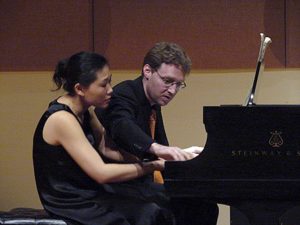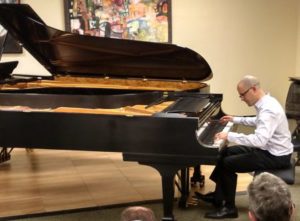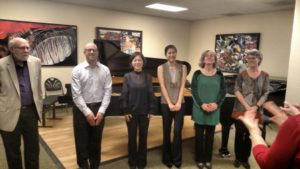Makrokosmos Project review: Tag-teaming a piano classic
Some of Oregon’s finest classical pianists join forces to perform Rzewski’s revolutionary piano masterpiece
NOVEMBER 21, 2016
by TERRY ROSS
If you think you have to leave Oregon to hear really first-rate piano playing, you should have been at Portland Piano Company on the evening of November 13, when a team of six Oregon residents collaborated with New York City duo Stephanie Ho and Saar Ahuvia to play the living daylights out of some extremely challenging contemporary music.

DUO Stephanie & Saar
Stephanie & Saar (their official performing name) got things underway on nested 10-foot concert grands (a Fazioli and a Steinway) with two pieces by Timo Andres, a young composer from Brooklyn, from his larger work Shy and Mighty, written in 2007. Mr. Andres, only 31 years old, is an extremely prolific composer with enviable commissions to his name, well worth keeping an eye on. The first selection, “Antennae,” seven minutes long, starts off as motoric minimalism, switches to angular gestures played fortissimo (really loud) and returns to minimalism at the end.
In the nine-minute second piece, “How can I live in your world of ideas?,” Mr. Ahuvia played drone-like figures while Ms. Ho (musically) commented freely. The musical language throughout is mainly tonal but wildly eclectic, full of energy and showy effects. “How can I live” ends with a series of quiet arpeggios preceding chords played simultaneously on both pianos. Stephanie & Saar were lively, engaging performers, and their ensemble playing impeccable.
The stage was now well set for the main offering of the evening: The People United Will Never Be Defeated!, an hour-long essay for solo piano by Frederic Rzewski (pronounced ZHEFF-skee). This rarely performed piece had been originally scheduled last June as the first concert in a series called the Makrokosmos Project, but illness forced a cancellation. Now, with the original six players all recovered, Rzewski’s music could finally take center stage.
And center stage, at Portland Piano, consisted of a small room holding the two giant pianos and about 40 audience members in folding chairs. This setup, along with some acoustical tile in the ceiling and a carpeted floor, proved ideal for listening to piano music. In a bare room without the tiles and carpet, the sound would have been too much, but as it was, one could appreciate the muscularity of the instruments (and the players) without being blown out of the room.
This is important, because in The People United, the composer has made every effort to explore the resources of the piano. One critic, commenting on Rzewski’s playing, remarked that “he is furthermore a granitically overpowering piano technician, capable of depositing huge boulders of sonoristic material across the keyboard without actually wrecking the instrument.”
“Huge boulders” there were aplenty at Portland Piano, but also the most delicate (and quiet) traceries of arpeggios and myriad other effects. After an initial statement of the affecting melody, the six players present 36 variations on the tune, in groups of six. According to Rzewski, these groups represent “simple events, rhythms, melodies, counterpoints, harmonies, and combinations of all of these.” In fact, all of the groups contain variations of “all of these,” with a great deal made of contrasts in tempo and volume.

Alexander Schwarzkopf
It’s tempting to think that enjoying the piece depends on hearing it performed live under such ideal conditions, but although the live performance underlines the piece’s power and intelligence, The People United can stand on its own as a masterpiece. Based on a melody written by Chilean songwriter Sergio Ortega in 1969 during the brief and ill-fated days of Salvador Allende’s democratically elected government soon deposed by a CIA-backed military coup, it takes its place in the political ferment of its time. But it maintains its power through musical means, irrespective of politics.
To this listener, The People United achieves its climax in the fourth set of variations, “counterpoints.” The score abounds in encouragement: “with energy,” “relentless, uncompromising,” “as fast as possible.” The set emerges as by far the most virtuosic of the six. Eugene pianist Alexander Schwarzkopf threw himself into the cauldron and gave a stunning, magnetic performance.
Also outstanding were University of Portland and Portland State University instructor Julie Hwakyu Lee in the first section, Korean native and local teacher Lydia Chungwong Chung in the second, and Lewis & Clark College professor (and Third Angle New Music pianist) Susan DeWitt Smith in the third (“melodies”), which offers a sort of mid-point summation. PSU emeritus prof Harold Gray (who formerly led the Florestan Trio and Portland Piano International) played the fifth and longest set (“harmonies”) with feeling, and Reed College instructor Deborah Cleaver gave us the final set, including an optional cadenza of her own devising, during which she once yelled out and, later, sang a wordless note.
These exclamations proved a fittingly ebullient ending to a superbly played concert.

The next concert in the Makrokosmos series will be on June 29, 2017. REICHMOKOSMOS! will be a celebration of Steve Reich’s 80th birthday, featuring music of Reich and others.
Recommended recordings
• Andres, Shy and Mighty, David Kaplan, piano, 2010 (Nonesuch 522413).
• Rzewski, The People United Will Never Be Defeated!, Marc-André Hamelin, piano, 1998 (Hyperion CVDA67077).
Terry Ross is a Portland freelance journalist and the director of The Classical Club, through which he offers classical music appreciation sessions. He can be reached at classicalclub@comcast.net.


